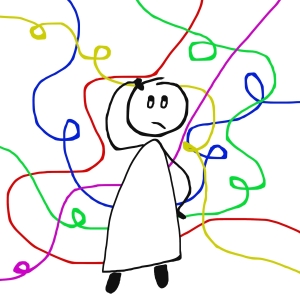
Panic at 3500 Feet
One bright morning, my husband and I flew in his little Maule MX-7 from our crooked, grass strip to his parent’s house sixty miles away. As we cruised toward the sun, a few cotton-ball clouds dotted the patchwork of fields below us, but the skies above were clear.
Ten minutes later, a solid white blanket cloaked the ground.

Fog is intimidating when you’re on the road, but it’s downright hair-raising from the air, especially for this white-knuckle flyer.
After vowing silently never to fly again, I pointed out the obvious to my husband. “We can’t land in this!”
“It’ll lift before we get there,” he said, his hands firmly on the control wheel.
We followed the straight line on the GPS screen until we reached the destination point — his father’s farm. We circled the area and searched for an opening in the clouds but found none.
Anxiety taunted me: What if the fog doesn’t lift for hours! The plane will run out of fuel!
We circled again. I prayed, HARD. After one more go-around, the summer sun burned a hole in the fleecy cover, and we were able to land.
Despite my doubts, my husband knew what he was doing. He had studied the forecast and knew the weather conditions – dew point, temperature, and wind – were improving.
How Are Your Writing Conditions?
Sometimes, even the most conscientious scribblers inadvertently create their own WRITING FOG — a hazy state of confusion and bewilderment. Momentum slows, and finishing — or starting – a project becomes a tricky prospect.
If this occurs while you’re working on a story, you can’t see where the plot is heading. Or maybe your theme becomes fuzzy.
You may encounter Writing Fog between projects: one work is complete, but your vision for the next is blurry. You become disoriented, panicky, uncertain of your goals. You’re afraid you’ve lost creative energy. You’re afraid of crashing.
What Causes Fogginess?
Lack of planning. When I was a homeschooling mom, I was a dedicated (compulsive) planner. I scheduled every thirty minutes of my day. If I didn’t, I couldn’t get the laundry done. Or the meals. Or anything.
But I reached a point where my ever-increasing To Do list was making me nervous. So, I swung to the opposite extreme and NEVER made a schedule. No plans, no calendars, no lists. This also had its problems, such as missed appointments, late bills, and a serious lack of focus.
Winging it with your writing will give you similar results. That’s not to say you must write a fifty-page outline before you draft your story. And it’s okay if you can’t envision exactly what your next project will be. But a little planning can prevent you from getting lost. Think of it as GPS for authors.
Over-thinking.

This condition is a symptom of the never-ending, futile quest for Perfection. It’s a trap. A labyrinth of circular thoughts which leads right back to Start, or worse, to No-man’s-land. When you over-think, you edit beyond the point of practicality. Is revising your work for the thirty-ninth time really going to make a significant difference? Or are you simply stalling? Finish the thing already. Excessive analyzing stems from not trusting yourself, which leads to another pitfall…
Too much advice. I love my writing podcasts, blogs, vlogs, courses, books, and #writingtips. But they can be too much of a good thing. All the brilliant but conflicting voices become a jumble of blah, blah, blah, until I don’t know what to believe. One expert says to create extensive character profiles; another says to allow characters to grow organically. Who’s right? In the end, you should go with your gut.
Over-dependence on others’ advice makes you passive. Passivity leads straight into the pea-soup of self-doubt and indecision.
If you’re in a muddle, and you can’t see the next story, the next scene, or the next sentence, consider whether one of these three conditions is to blame. Here’s hoping the mist will clear and bring your thoughts back into focus.
